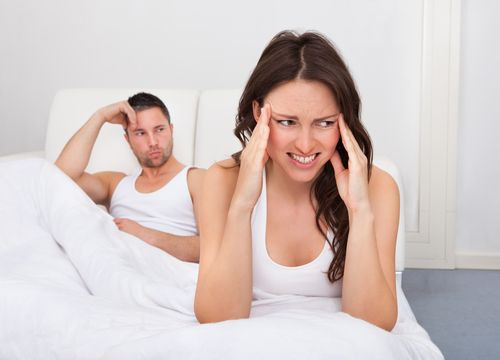Female Sex Drive Diminishes In Presence Of Pain, But Not Males': The Headache Excuse Is Real

Women sometimes defer hot and steamy sex because they’re tired or in pain. For men, these moments are seldom, as they are ready to get busy between the sheets and cannot fathom why their partner isn’t up for a romp in the sack. But the "I have a headache" excuse men dread to hear is not just a myth. According to a recent study to be published in the Journal of Neuroscience, even mild pain can curb a woman’s sex drive, while severe pain has no effect on men’s sexual desires.
"We know from other studies that women's sexual desire is far more dependent on context than men's — but whether this is due to biological or social/cultural factors, such as upbringing and media influence, isn't known," said Jeffrey Mogil, a psychology professor at McGill and corresponding author of the new study, in the McGill University news release. Mogil and his research team believe there could be an evolutionary biology explanation for pain-inhibited sexual desire in humans, aside from the sociocultural one. The Canadian researchers suggest this could be nature’s way of stopping women from getting pregnant and taking on the responsibility of raising a child while they are in pain or ill.
In an effort to explore the “I have a headache" excuse, Mogil and his colleagues sought to investigate the direct impact of pain on sexual behavior in mice. The male and female mice were grouped in pairs of two and placed in different chambers to evaluate the sexual motivation of the rodents when pain occurred. Also, their sex drive was measured when a pain-relieving drug was administered.
In some pairs, the female was administered the hurt-shot, and in other pairs, it was the male. To rule out the possibility the mice’s sex drive was disrupted by specific discomforts, such as a hurting rear paw, or a pain in the genitals, pain-inducing shots were injected in a number of different bodily sites, the Los Angeles Times reported. This was to ensure that the female mice would be sexually appealing to male mice.
The pairs were left in a mating cage divided by a barrier with openings too small for male mice to squeeze through. The design was done intentionally to determine whether, and how long, female mice spent time with a male partner before withdrawing to an adjoining room by themselves. Overall, the female mice spent less time on the male side of the testing chamber, and as a result, there was less sexual behavior. However, when the females were injected with a pain-reliving drug, their sexual motivation was revived.
In an undivided chamber, the male mice had free access to a female partner in heat. Their sexual behavior was found to be completely unaffected by the same inflammatory pain as the female mice in the other pairings. For males, even a pain in the penis did not diminish their sex drive. In regard to pain perception, there were no differences between the sexes.
The findings of this study can help lead to a better understanding of why migraine sufferers, people with arthritis, and others who suffer from chronic pain lose interest in sex. "This research provides an animal model of pain-inhibited sexual desire that will help scientists study this important symptom of chronic pain," said Professor Yitzchak Binik, a professor of psychology and director of the Sex and Couple Therapy Service at the McGill University Health Center, in the press release.
Understanding sex differences when it comes to pain can lead to a more comprehensive view of how sexual responses are organized or processed in the brain. It is important for doctors to understand how certain pain or illnesses and treatments can impact the sexual lives of men and women. For example, chronic pain and its treatment can affect the ability for men and women to express sexuality. Psychological, physiological, and pharmacological factors are all common in chronic pain, which can contribute to changes in sexuality. The medications used to treat pain can create problems with sexual expression, says the American Chronic Pain Association Chronicle, via changes in blood flow, hormones, or the nervous system.
Source: Farmer M, Mogil J. Pain Reduces Sexual Motivation in Female But Not Male Mice. Journal of Neuroscience. 2014.
Published by Medicaldaily.com



























